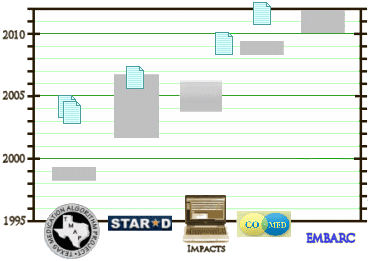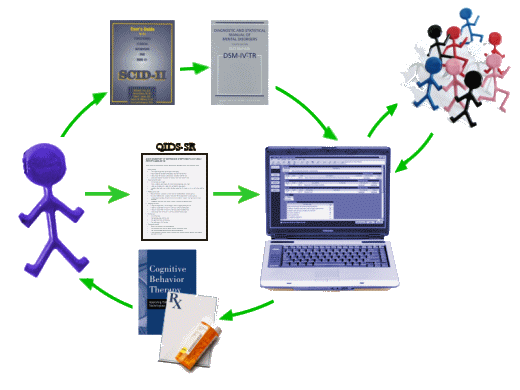I suppose I can make up a way to hear that without foaming at the mouth. Since we don’t know the etiology of most of the conditions we treat, everything is a hypothesis in a way. Shizophrenia is a well defined clinical entity, but at some level, our grouping such patients under a unifying nosology hypothesizes a unitary cause – something we don’t know to be true. But that’s not what Dr. Regier means. He is proposing that we include hypothetical groupings in the DSM-5 diagnostic Manual and see how they pan out – that we use the DSM-5 as a clinical trial [I’m having trouble not putting statements like that in bold, colored, underlined text, followed with exclamation points – "use the DSM-5 as a clinical trial!!!!!"].
 Dr. Regier has served for the past seven years as Executive Director of the American Psychiatric Institute for Research and Education (APIRE), as well as Director, Division of Research at the American Psychiatric Association (APA). APIRE is an independent 501(c)(3) Research Institute component of the APA, with its own Board of Directors and research mission in mental health services, health policy, epidemiology, and nosology/psychopathology research and research training. It also supports psychiatric education and other career development programs. A principle responsibility has been to coordinate the maintenance and revision plans for the APA’s Diagnostic and Statistical Manual. This has involved coordinating a series of Research Agenda white papers and serving as Principal Investigator for an NIH Conference grant to review the research basis for mental disorder diagnoses. In 2006, he was named Vice-Chair of the DSM-V Task Force to work jointly with the Task Force Chair, Dr. David Kupfer.
Dr. Regier has served for the past seven years as Executive Director of the American Psychiatric Institute for Research and Education (APIRE), as well as Director, Division of Research at the American Psychiatric Association (APA). APIRE is an independent 501(c)(3) Research Institute component of the APA, with its own Board of Directors and research mission in mental health services, health policy, epidemiology, and nosology/psychopathology research and research training. It also supports psychiatric education and other career development programs. A principle responsibility has been to coordinate the maintenance and revision plans for the APA’s Diagnostic and Statistical Manual. This has involved coordinating a series of Research Agenda white papers and serving as Principal Investigator for an NIH Conference grant to review the research basis for mental disorder diagnoses. In 2006, he was named Vice-Chair of the DSM-V Task Force to work jointly with the Task Force Chair, Dr. David Kupfer.
Prior to taking this position, Dr. Regier completed 25 years at the National Institute of Mental Health (NIMH), during which time he directed three research divisions in the areas of epidemiology, prevention, clinical research, and health services research. He initiated the development of several areas of research including national surveys of prevalence of mental disorders, mental health service use in primary care and specialty settings, the organization and financing of such services, and international programs on the classification of mental disorders with the World Health Organization. He served as the Scientific Coordinator/Director for four National Advisory Mental Health Council reports to Congress on mental health insurance parity, and was a section editor of the Surgeon’s General’s Report on Mental Health. In the international arena, Dr. Regier served as the mental health coordinator for the Health Committee of the U.S./Russian Commission on Science and Technology and remains as a consultant to the World Health Organization’s mental health initiatives.
An Interview with Darrel A. Regier, MD, MPH:
The Developmental Process for the Diagnostic and Statistical Manual of Mental Disorders, Fifth Edition
CNS Spectrums. 2007;13(2):120-124.
One of the most important advances in the field since the publication of the DSM-IV has been the emergence of greater attention to what has been referred to as measurement-based care, particularly brought out in the recent Sequenced Treatment Alternatives to Relieve Depression [STAR*D] clinical trial, which emphasized the need to be able to measure both the thresholds for disorders on some kind of continuous scale as well as be able to look at the response to treatment on such a scale.For years, researchers have known that to conduct clinical trials, it is necessary to have dimensional measures of severity and to establish adequate thresholds. Instruments such as the Quick Inventory for Depression Scale are being used more often, such as in the STAR*D study. In routine primary care settings, there has been an increasing reliance on instruments like the nine-item Patient Health Questionnaire to assess what is a severe illness and what is an adequate treatment response.
Throughout the full range of mental disorders, measures like these have been used in research studies. Researchers are now very interested in looking at dimensional measures for assessing thresholds for disorders and providing some guidance for clinicians to be able to look at a way of monitoring treatment response…

-
TMAP: Defunct. Coming soon – the trial of a suit against J&J alleging [convincingly] that TMAP was a scam to sell drugs to public health systems.
-
STAR*D: A failed $35 M study with no results other than endless articles.
-
IMPACTS: A computerized algorithm study that was never done.
-
COMED: Another failed study – combination treatment.
-
EMBARC: Dr. Trivedi’s study to predict responses using biosignatures – already doomed in my opinion.
Report by the ACNP Task Force on response and remission in major depressive disorder.
by Rush AJ, Kraemer HC, Sackeim HA, Fava M, Trivedi MH, Frank E, Ninan PT, Thase ME, Gelenberg AJ, Kupfer DJ, Regier DA, Rosenbaum JF, Ray O, and Schatzberg AF; ACNP Task Force.
Neuropsychopharmacology. 2006 Sep;31(9):1841-53.
[full text on-line]
This report summarizes recommendations from the ACNP Task Force on the conceptualization of remission and its implications for defining recovery, relapse, recurrence, and response for clinical investigators and practicing clinicians. Given the strong implications of remission for better function and a better prognosis, remission is a valid, clinically relevant end point for both practitioners and investigators. Not all depressed patients, however, will reach remission. Response is a less desirable primary outcome in trials because it depends highly on the initial (often single) baseline measure of symptom severity. It is recommended that remission be ascribed after 3 consecutive weeks during which minimal symptom status (absence of both sadness and reduced interest/pleasure along with the presence of fewer than three of the remaining seven DSM-IV-TR diagnostic criterion symptoms) is maintained. Once achieved, remission can only be lost if followed by a relapse. Recovery is ascribed after at least 4 months following the onset of remission, during which a relapse has not occurred. Recovery, once achieved, can only be lost if followed by a recurrence. Day-to-day functioning and quality of life are important secondary end points, but they were not included in the proposed definitions of response, remission, recovery, relapse, or recurrence. These recommendations suggest that symptom ratings that measure all nine criterion symptom domains to define a major depressive episode are preferred as they provide a more certain ascertainment of remission. These recommendations were based largely on logic, the need for internal consistency, and clinical experience owing to the lack of empirical evidence to test these concepts. Research to evaluate these recommendations empirically is needed.
-
specifically and repeatedly measure core criterion depressive symptom severity to guide the implementation and timely modification of treatment,
-
conduct sufficient visits or measurements to establish that 3 consecutive weeks of minimal to no symptoms [ie, remission] has or has not been achieved,
-
systematically inquire about the magnitude and types of side effects and overall side-effect burden, so as to accurately gauge whether the dose or type of treatment needs modification in order to achieve remission in a time-efficient fashion, and
-
follow the trajectory of symptom change [or lack of change] such that treatments [dose, type] can be modified in a timely fashion, hopefully informed by empirically defined triage points.

“Since we don’t know the etiology of most of the conditions we treat, everything is a hypothesis in a way.”
Mickey, unless you are including tertiary syphilis, I would amend this sentence to read “…we don’t know the etiology of ANY condition we treat…”
There are many well educated and bright people out there who have no idea what psychiatry is all about.
IMO, the reason is that psychiatry has no idea what it’s all about.
All I know is that these arbitrary and subjective labels that are assigned to certain individuals quite often destroy their lives. And that’s all I know. And IMO, that’s all anyone needs to know.
Duane
timely posts
dimensions seem to be an emerging topic
http://alert.psychiatricnews.org/2011/11/dimensional-measures-show-significant.html
Dimensional Measures Show Significant Comorbidity Among Seriously Mentally Ill
Dimensional diagnostic measures, such as those being proposed for use in DSM-5, reveal a more complex symptom profile for public-sector patients with serious mental illness than do categorical diagnoses, said William Narrow, M.D., M.P.H, associate director of APA’s Division of Research, at a symposium at APA’s Institute on Psychiatric Services last week in San Francisco. Narrow presented a study by the American Psychiatric Institute for Research and Education in which rates of categorical diagnoses and dimensional symptom ratings were examined for patients with schizophrenia, major depressive disorder, PTSD, and substance use disorders.
For each of these diagnostic groups, the dimensional ratings revealed significant comorbidity that was not captured by the DSM-IV categorical diagnoses. For instance, among patients with schizophrenia, 10 percent had anxiety symptoms that were rated as “severe,†and 73 percent had symptoms of anxiety that were either “mild†or “moderate.†Yet only 6 percent had received a diagnosis of anxiety.
Psychiatric News is running a series of articles titled “DSM-5: Advancing Diagnostics†about proposed changes to the manual, including the dimensional measures that are being proposed. See Psychiatric News
The article links to DSM5 dimension measurement instruments which in turn link to PROMIS
http://www.nihpromis.org/about/abouthome
Patient Reported Outcomes Measurement Information System (PROMIS) is a system of highly reliable, precise measures of patient–reported health status for physical, mental, and social well–being. PROMIS tools measure what patients are able to do and how they feel by asking questions. PROMIS’ measures can be used as primary or secondary endpoints in clinical studies of the effectiveness of treatment.
Thanks Jamzo. This looks like it will take some reading…